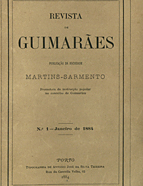

................................
From the mid-19th century onwards, the advancement of the experimental sciences and the humanities was closely linked to the expansion of the periodical press (J. A. Mendes, Desenvolvimento e estruturação da historiografia Portuguesa [Development and structuring of Portuguese historiography], 1996, pp. 211-12). The year 1880 can be regarded as symbolic. It marked a period of varied cultural activities, including the commemoration of the Tricentenary of the Death of Camões, the hosting of the International Congress of Prehistoric Archaeology and Anthropology in Portugal, and the publication of the work Ora marítima by the Latin geographer Rufius Festus Avienus, edited by Martins Sarmento, who gained wider recognition as a result (J. M. de Almeida, Revista de Guimarães: um século… [Guimarães Journal: a century...] , 1984, p. 480). According to Justino Mendes de Almeida, the Revista de Guimarães [Guimarães Journal] is a scientific publication, preceded only by the following similar publications: As memórias da Academia das Ciências [Memoirs of the Academy of Sciences] (dating back to the late 18th century); O Instituto [The Institute] (1853), Boletim da Associação de Arqueólogos [Bulletin of the Association of Archaeologists] (1865), and the Boletim da Sociedade de Geografia de Lisboa [Bulletin of the Lisbon Geographical Society] (since 1876). The A Revista de Guimarães was conceived in 1883 within the Sociedade Martins Sarmento [Martins Sarmento Society] and first published in 1884—a year marked by other significant events, such as the founding of the Ateneu Comercial do Porto [Porto Commercial Athenaeum], the issuance of Joaquim António de Aguiar's decree on technical education, and the publication of Sistema de Sociologia [Sociology System] by Teófilo Braga. Internationally, the Berlin Conference took place, concluding the following year.
This work is financed by national funds through FCT - Foundation for Science and Technology, I.P, in the scope of the projects UIDB/04311/2020 and UIDP/04311/2020.
